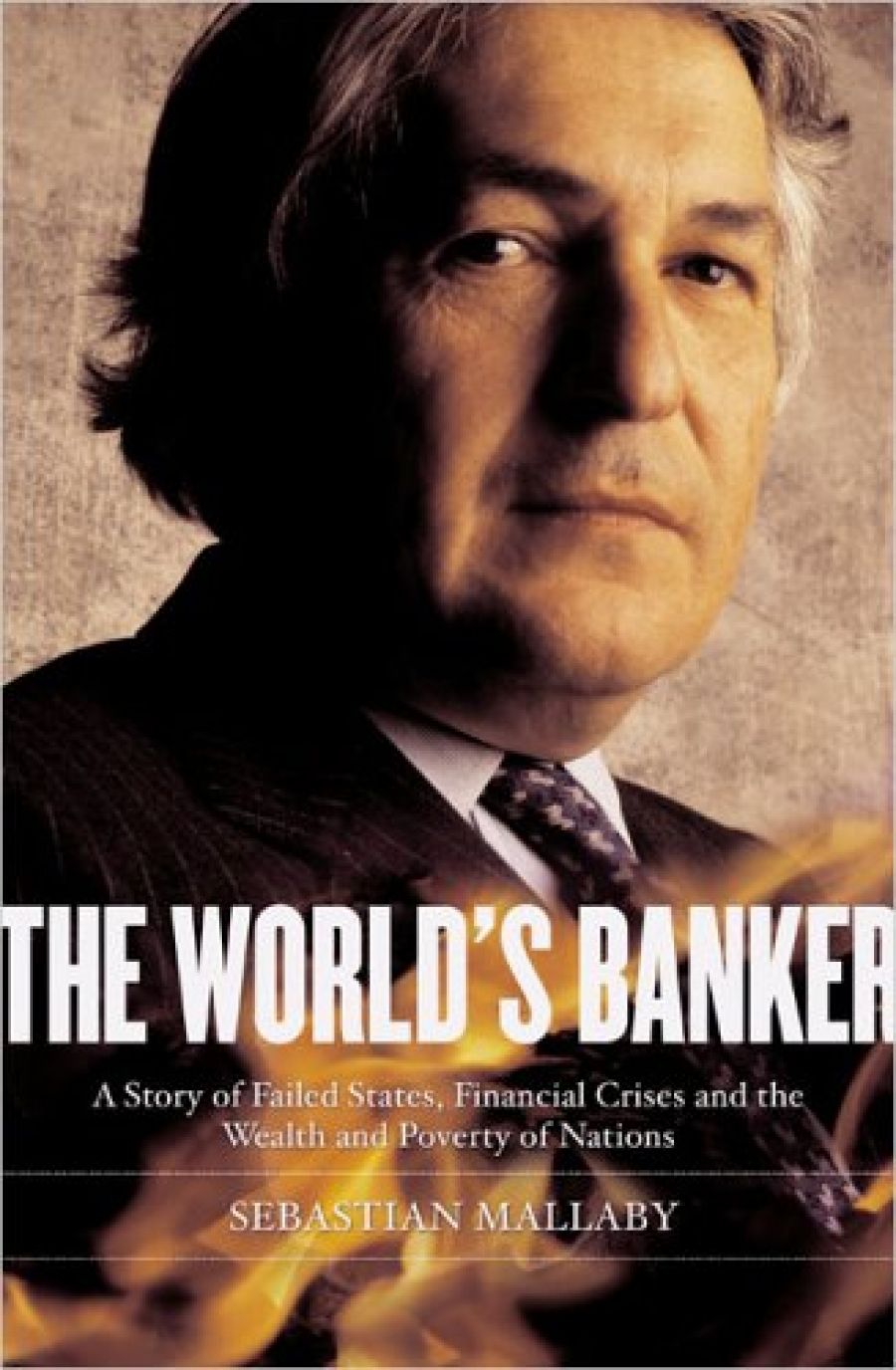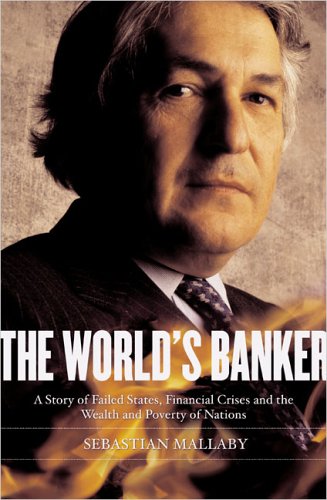
- Free Article: No
- Contents Category: Biography
- Review Article: Yes
- Article Title: Colossus with cello
- Online Only: No
- Custom Highlight Text:
Each day I commute with Melbourne’s wage slaves on a privatised transport system that is invariably overcrowded due to cancelled or delayed trains. Dark thoughts whirl as I read Sebastian Mallaby’s The World’s Banker, a tale of ambition multiplied by ambition. In recent weeks, I have edited countless business stories, many of them half-year reports boasting profits of tens or even hundreds of millions of dollars, some increased by more than 100 per cent. Meanwhile, in the Third World, the raison d’être of the World Bank, children die for the want of mosquito nets worth two dollars. So what has James Wolfensohn achieved at the World Bank, and what has the World Bank achieved? According to Mallaby, there has been a real decline in world poverty. But one of the greatest achievements is the housing, feeding and clothing of thousands of the world’s neediest economists.
- Book 1 Title: The World's Banker
- Book 1 Subtitle: A story of failed states, financial crises and the wealth and poverty of nations
- Book 1 Biblio: UNSW Press, $39.95 pb, 462 pp
- Book 1 Cover Small (400 x 600):

- Book 1 Cover (800 x 1200):

Wolfensohn, an Australian Jew, should be one of my heroes. Ambitious, talented and frustrated, he makes good. Yet there is only a millimetre between charm and smarm, despite Wolfensohn’s sympathy for the world’s poor. ‘Don’t moan, organise’ is one thought that comes to mind in my sardine-packed Connex train, precision-built by Siemens: a good metaphor for the pre-Wolfensohn World Bank. The concept was fine, but the execution ignored reality. Perhaps the German designers could not imagine a cancelled train, and all commuters have seats, none requiring straps. Perhaps the designers never took a peak-hour train.
The World Bank had some similarly bright ideas, such as the privatisation of public utilities to get your miserable country into World Bank–IMF shape, suitable for loans intended for development but knowingly diverted to the private coffers and armies of Pinochet, Suharto and Marcos. Another idea was the elimination of public flab, even if it worked reasonably well, to make it lean, mean and private, though not necessarily efficient.
The history of the World Bank is a tragic tale of a financial colossus going to seed under inappropriate presidents with bizarrely diverse ideas of their roles at the controls of the developing world’s pump primer. Down in the engine room, brilliant young economists were set an array of tasks that could only lead to one result – more staff and bigger premises. To be fair, the bank did manage to lend US$20 billion a year and to scrutinise where much of it went, but during the twenty years that Wolfensohn bided his time, the colossus grew old, fat and slow, and began to totter alarmingly.
Mallaby opens Chapter Four with a romantic analogy of Wolfensohn to Gabriel Garcia Márquez’s Florentina Ariza wooing Fermina Daza. Rejected by Fermina when she is young and beautiful, Florentina finally wins his Fermina many years later when her skin is wrinkled and her breasts sagging. When they were young, they could have made the world sing. But now? Wolfensohn bounded like a greyhound to his long-awaited prize. He exploited his business, banking, political and cultural contacts, and reminded anyone with clout that he was the man for the job. Bill Clinton proved to be just the president to make him president.
Mallaby’s enthralling, intertwined tale of Wolfensohn’s ambition to make his parents proud and of the rot that set in at the World Bank is an impressive compendium of information translated into a surprisingly good read. But there is something rather old school about Mallaby when he tilts at his pet hates. It grates with the rest of the book’s achievements. There is sympathy for the World Bank, but less for the banker. All the insults hurled at Wolfensohn are recorded, including the ‘Bank Swirled’ greeting. He arrived with everything from a private jet and a koala in a cage to a Gutenburg press. ‘In addition adjacent office space was allocated to his court composer, his chamber orchestra, his biographer and the 1996 Australian men’s Olympic fencing team.’
Wolfensohn has never said he isn’t ambitious or vain, and it’s quite appropriate for his biographer to point out his foibles. But much of the World Bank’s misbehaviour is overlooked. The word ‘privatisation’ does not appear in the index. Nor do the disastrous structural adjustment programmes. At least they are mentioned in the text, albeit without investigation. Worse is Mallaby’s antipathy to ‘No Gos’, which he derides as ‘Lilliput’s mini warriors’. From Greenpeace to Oxfam, they are in fact able to focus world attention on the bank’s failings, despite multi-million-dollar public relations campaigns to regain the agenda. Mallaby’s sneers make him sound like a preppy snob instead of the otherwise masterful historian that he is. Mallaby condemns the environment groups for their attacks on the World Bank while documenting that it didn’t care about the environment until those groups pressured it to do so. Wolfensohn changed all that. He talked directly to NGO’s. The bright young things were as ecstatic with ‘the whirlwind of fresh air’ as the barons were apprehensive about it.
‘“Poverty alleviation is the single most important problem” … he declared … and Kris Zedler, the official who had been recruited to deal with … the No Gos, remembers “skipping down the halls” in her excitement.’ Upstairs, there was less enthusiasm. Wolfensohn set out to change the bank. He succeeded in making it a more vibrant, reactive lender for reconstruction rather than the profiteer from the world’s misery it had been. Wolfensohn threw the bank, successfully, into Bosnia. There is something petulant, even tabloidish, about Mallaby’s account of this phase. He recounts how a French official didn’t appreciate being dog-’sneefed’ for security reasons, and later contends that this is why the French refused to fund the reconstruction of Bosnia. Really?
Referring to the popularity of management consultants in the 1990s, Mallaby states that the British government spent $500 million on consultants. My memory is that it was £500 million and that their job (not disclosed in Mallaby’s book) was to uncover public sector waste, which they did – all of £12 million.
Mallaby jumps unsubtly from the dynamic merchant banker, concert cellist, Olympian Wolfensohn to the eccentric and volatile Wolfensohn. Is this really balance? Mallaby concedes that he is partial to both views, but he is clearly trapped in his own dichotomy. Like many non-Australians, he doesn’t recognise a larrikin with chutzpah when he sees one. Similarly grating is Mallaby’s defence that the World Bank had problems but was not a basket case. He mentions the hated structural adjustment programmes, but not why they are unpopular. He skips over the World Bank’s adoption of Thatcher–Reagan monetarist policy, widely recognised these days as economic irrationalism gone mad. Mallaby appears to have greater respect for the institution than its reformer, who steps down in May 2005, after ten years at the helm.
As Australia’s reporting season closes and everyone from child-care centres to funeral parlours post record profits, one woman dies every minute in childbirth, one billion people don’t have drinkable water and half the planet lives on less than US$2 a day.
Meanwhile, the 7.54 a.m. City Loop has been cancelled, again.


Comments powered by CComment